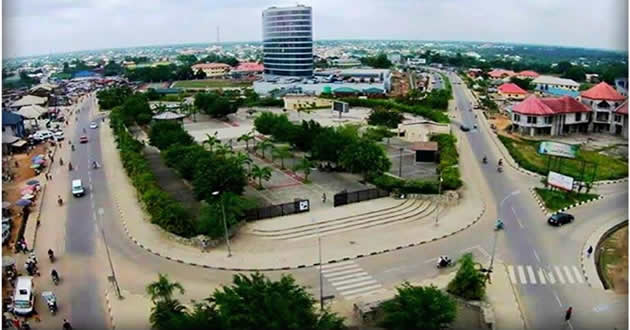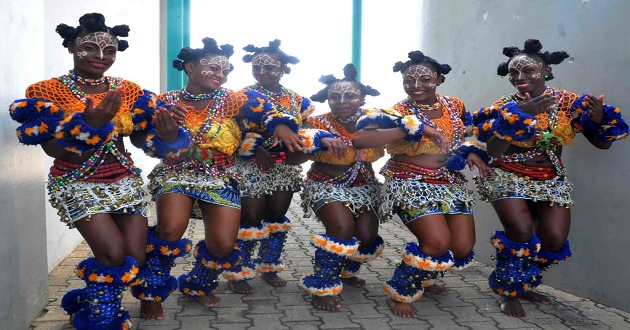
Latitude: 5.17938 Lat (DMS) 5°10'55'' N
Longitude: 7.7148099 Long (DMS) 7°42'53.3'' E
Elevation (Feet): 24 meters / 78.74 feet
Population Est.(2006): 174,137
Zip Code: 530101
History
Ikot Ekpene is a popular and historic town in south-southern state of Akwa Ibom, Ikot Ekpene also referred to as “raffia town”, is largely regarded as a citadel of arts. The city derives its name from the village of Ikot Ekpene which originally was made up of ten families with a long and rich history. It is the political and cultural capital of the Annang ethnic group in Nigeria (Nair, 1972).
The town is located on the A342 highway that parallels the coast, between Calabar to the south east and Aba to the west, with the state capital, Uyo, on this road just to the east. Umuahia is the next major town to the north. Kannan Nair, the noted historian described the town as a cultural and political capital of the Annangs and the Ibibios. The Ibibios live to the east and most of the Annangs live to the south of the town.
Ikot Ekpene is known as a regional centre of commerce, with notable exports of palm products, especially palm oil, kernels, raffia products including raffia fibers and its wine, and ground crops of yams, cassava, taro, and corn. The population is made up primarily of the Annang people with a small number of Igbo traders and Hausa Suya vendors.
Significant exports also include basket weaving, sculpture, and, most notably, raffia cane furniture (hence the colloquial name of the town). Though most inhabitants of the area did not have direct contact with European traders who they called Mbakara until early in the twentieth century, it is believed that European articles of trade reached the people beginning in the 17th century.
In November 1903, British troops arrived in the area from Calabar and the following year established a garrison there in January 1904, putting Umoren Eyenobong (known as swordwearer by the Europeans) from Ukana in charge of the immediate Annang people. From Ikot Ekpene the troops marched to Uyo and from there to Abak and Opobo (now Ikot Abasi). Between 1904 and 1910, Ikot Ekpene became part of the Eyong District. In 1914 Enyong District was broken up into two: Enyong and Ikot Ekpene Districts. The new Ikot Ekpene District included Uyo and Abak with the headquarters in Ikot Ekpene town (Akpan, 1967).
By 1919 trade with Europeans opened up as the town became an administrative center. The following companies had posts and stores in the town: John Holt Cooperative Wholesale Society Paterson Zochonos (PZ), G. B. Olivant and the Compagnie Francaise de L'Afrique Occidentals. The establishment of these companies resulted in an exodus from the surrounding areas and made Ikot Ekpene a vibrant metropolis. In 1937, the colonial administration built the main market and separated those who sold imported European goods from indigenous articles. A slaughter house was added to allow for the inspection of meat.
In 1903, the British sent in troops and a garrison was stationed there at the main entrance to the town known as Control Post. The town was so important to the British that when a proposed road linking Owerri and Calabar in the late 1920s was to bypass the town, the British administrators abandoned the idea in favor of one linking Eket and Owerri in order to bring the town into the loop (Nair, 1972). It became the site of the experiment in local self governance by the British in 1951. It was also the birthplace of the famous Ibibio Welfare Union when James Udo Eka teamed up with Udosen Obot at Methodist school in Ikot Obong Edong ( Noah, 1988).
Under the British the town became the seat of both the (Annang), Division and (Ikot Ekpene) County Council. Today it is a municipal center in the state of Akwa Ibom. Ikot Ekpene, probably more than any other town, was seriously impacted in the Biafrian civil war. It had strategic military and political importance to both the Biafrians and Nigerians. The town and the area changed hands at least 3 times in this bitter conflict. Following the war, the new reorganization and state structure led to policies that did not recognize the historic importance of the town as most of the Annang leaders were massacred during the war.

Like most Annang communities, Ikot Ekpene has a tradition of self-improvement from its sons and daughters, both near and far. Several groups are working together to recapture and rebuild what they fondly call "The Raffia City". Ikot Ekpene has a long history of transforming the raffia fibre into cloth used in shoes, hats, handbags, mats and with distinctive cultural carvings made out of wood. These unique arts and crafts trades have continued alongside traditional agriculture.
Many foreign organizations and churches are present in the area. Four institutions of higher learning have added a richness to the town: the Akwa Ibom state polytechnic, Ikot Osurua, the School of Nursing, the St Joseph Major Theological Seminary and Ritman University.
People
The people of Ikot Ekpene Local Government Area are of Annang extraction and they speak Annang language.
Culture
Their rich cultural heritage is expressed in Ekpo, Abiakpo, Uta, Ikon (men) and Asian Akananwan, Asian Uboikpa, Mkpapo, Abang (women).
Natural Resources
The natural resources include palm produce, kernel oil, raffia, gravel, sharp sand, laterite, clay, timber.
Commerce
The people are basically farmers, craftmen, hunters, raffia craftmen, wood carvers, and artisans.
Famous Places
Ikot Ekpene town plazaLocated in the heart of Ikot Ekpene. The town plaza consists of a long tree lined promenade with two outdoor dining areas either side of an exciting central fountain. A bandstand forms a major architectural feature and is a venue for outdoor entertainment along with a large outdoor viewing screen to show soccer games and films. Complimenting facilities include a maintenance building, car park, public toilets and an access footbridge which in actual fact, seems to draw tourists from far and wide.
The Raffia-Co-operative Stores
A major tourist attraction, the Raffia-Co-operative Stores at Ikot Ekpene is popular for the raffia crafts and masquerades.
Ikot Ekpene Main Market
An old market in the city, this market provides an interesting glimpse into city’s culture. It is usually abuzz with middle class shoppers, all swarming around its roadside stalls and showrooms. tourists most times explore this markets for souvenir.
Ikot Ekpene Day.
The people of Ikot Ekpene have a holiday tagged “ Ikot Ekpene Day”. The day is set aside to honour the city of Ikot Ekpene, also called “the Raffia City”. The celebration which is observed by the town’s inhabitants and original families, takes place shortly after Christmas and is celebrated annually .
Banks in Akwa Ibom
Brief History of Akwa Ibom
Business and Economy
Festivals and Carnivals
General and Teaching Hospitals
Hotels and Guest Houses
Local Governments & LCDAs
Akwa Ibom State Ministries Agencies and Parastatals
Police Stations
Popular Markets
Prominent Towns
Restaurants, Bars, Night Clubs
Shopping Malls
Akwa Ibom State Executive Council
Tourist Attractions
Traditional Rulers




